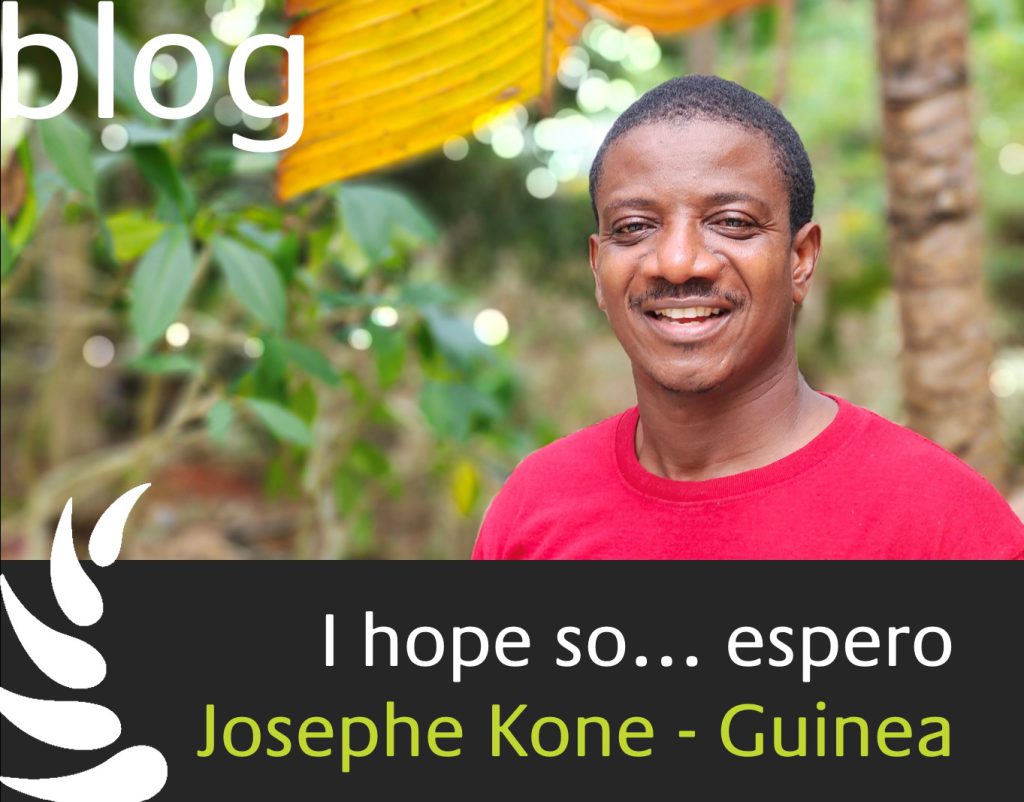“I hope so…”
By Chacko Jacob,
It was a quiet Sunday morning at the kanthari campus on September 5th,2021 when Joseph Christophe Kone awoke to news of trouble back home in Guinea. The country’s armed forces had captured the president after gunfire in the capital. A special forces commander then announced the dissolution of the government and the constitution.
While a dark cloud hung over the capital, something remarkable was being realized by the women of Kongonineh village, one of the communities that Joseph’s organization Espero works with.
Espero has a three-pronged approach to battling violence against women; a radio station with programming that affirms gender equality, a mixed boys and girls club where school children have fun while developing respect for each other, and an agricultural project for older women in 4 different communities to provide a means of livelihood.
Back in Kongonineh, it is the norm for women to be sent into the bush to give birth. The women, having decided that enough is enough, and aware that maternity clinics exist elsewhere, decided to take charge of the situation. Through Espero, around 75 native women were able to cultivate and successfully harvest a crop of beans. A portion of the money they gained was used to build a simple mud hut, which became a safer place than the bush to give birth. On his return to this village after the kanthari course, the sight of the hut moved Joseph to tears of happiness. He decided to share the story with an engineer who has come up with a plan to make it a proper facility. Joseph’s reaction is not surprising as he credits another set of strong women – his mother and sister- for his survival through the horrors of civil war in Liberia, where he is originally from. When their town of residence erupted in violence, it was his mother who evacuated him and his sister on foot to their village. To escape the rebels, the elderly and young children hid in a cave near a farm, while Joseph’s mother and sister would go out foraging for food every day.
Although the women of Kongonineh brightened his resolve to continue his work, the return home hasn’t been easy for Joseph: legal trouble with the neighbours who let their cattle ruin his rice harvest, ramifications of the military coup which includes document delays, and beneficiaries who grew overly expectant seeing Joseph’s increased girth, signifying wealth in the local context (it’s actually the result of the rich food from the kanthari kitchen).
Despite all this, Joseph trudges on. Before coming to kanthari, he had already garnered enough support from his local and international partners to finance and set up all the equipment for his radio station. But the need for a minimum 20,000 USD account balance to apply for a commercial radio licence has temporarily set Espero Radio back. The partners however, impressed with Espero’s new ideas and Joseph’s constant communication and openness, have decided to wait as long as needed until Espero gets its radio licence. This is a lesson for all changemakers in the value of maintaining good relationships with donors and supporters even when the going gets tough.
Espero has managed to setup 4 mixed boys and girls’ clubs in 4 schools. In these clubs, the children play sports, have birthday parties, debates and other fun activities. The important point here is to let kids be kids, but also develop a respect for each other that goes beyond gender and hence impacts gender disparity in the future. The children’s response has been overwhelming, some of them even barge into Joseph’s house at odd times, excitedly asking about what’s next on the agenda. An interesting aspect of these clubs is how the children democratically choose their activities. In the future they will also play a role in fundraising for the activities they want to do. A truly empowering idea.
In my last conversation with Joseph, I asked him what the rest of 2022 is going to be like, he said, “I don’t know where it comes from, but I have so much hope”. The name of his organization is now a perfect fit (Espero means “I hope so” in Esperanto). For Joseph, “Hope” is not a political catchphrase, or a wish that things will fall into place by themselves. It’s what drives him to carry on his work. He hopes that Espero Radio will start in December. He hopes that the women engaged in agriculture can expand to animal husbandry and other income generating activities. And, he hopes that the little boys and girls of Guinea will grow up to respect each other. Godspeed Joseph, “I hope so” too.



